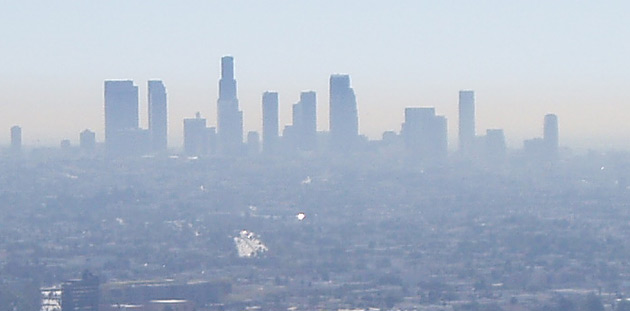It's pretty rare when a group of drivers begs a government agency to regulate them.
But when it could avert what they think would be even worse regulations from another agency, anything's fair in love and war.
The drivers in this case are the nation's long-haul truckers or, more precisely, the American Truck Dealers (which represents 2,000 dealers) and the Owner-Operated Independent Drivers Associations, which says it represents 156,000 truckers.

LeSabre Semi

Transportation Secretary Ray LaHood, a Republican member of the Cabinet, feigns being a blocking back for President Barack Obama as he arrives backstage to meet with GOP House leaders before speaking to their issues conference at the Renaissance Baltimore Harbor Place Hotel in Baltimore, Md., Jan. 29, 2010. (Official White House Photo by Pete Souza; http://www.flickr.com/photos/whitehouse)

A state-by-state emissions framework could prove prohibitively costly to automakers
DoT yes, EPA no!
Last month, the groups wrote to Transportation Secretary Ray LaHood, asking him to fight a proposal to transfer fuel-efficiency oversight for heavy trucks from the DoT's National Highway Traffic Safety Administration to the Environmental Protection Agency.
That legislation (contained in various bills to cap greenhouse gases, so far not enacted) would let the EPA regulate the fuel economy of medium- and heavy-duty trucks under the Clean Air Act, as it does now for light-duty passenger vehicles.
The problem is that under legislation passed in 2007, the NHTSA has to evaluate not only the deleterious efforts of vehicle emissions, but also such economic issues as any possible job losses due to the new regulations, and the overall health of the trucking industry.
NHTSA must look at jobs, industry health
The EPA's mandate to keep the air clean does not include any of those provisions. Under current law, the NHTSA must issue its first regulations by 2016 or before after studying test procedures and methodologies to measure fuel consumption in heavy trucks.
Language from the association treated the issue of potential job losses gently, but pointed out what many truckers feel to be an unavoidable truth: "An EPA heavy-duty truck fuel economy standard could result in significantly higher prices for new trucks."
Well, yes, it could. But so could a NHTSA standard. In fact, it's entirely possible that the two departments would cooperate to set a single standard, regardless of which one issues it.
Already working together
It's already clear that under the Obama Administration, the two agencies are being told to work together on single standard, as they did for light-duty passenger vehicles
Standing side-by-side with the Transportation Department, the EPA unveiled its final gas-mileage rules for 2012-2016 vehicles on April 1. That fulfilled a promise by the Obama campaign to bring both agencies and the automakers together soon after it took office.
Single national standard
The goal was to craft a single national standard for auto producers. Automakers had feared squabbling between the two agencies, leaving them without enough notice to make capital commitments to tool up for future fuel-efficient vehicles.
The costs of complying with the tighter rules, which are estimated to save 1.8 billion gallons fuel, have been calculated at $52 billion. It's unclear if that is entirely incremental cost. The two agencies are now beginning to address a single set of standards for 2017 and later.
Trucks: big polluters
Trucks rack up far more miles than do passenger cars, with far lower fuel economy, so they produce a disproportionate amount of emissions for the actual number on the road. Historically, they have been far less stringently regulated than light-duty vehicles.
But while a small number of pure electric vehicles will start to filter into the market over the next few years, long-haul trucking is expected to rely on fossil fuels--diesel or perhaps natural gas--for decades to come.













